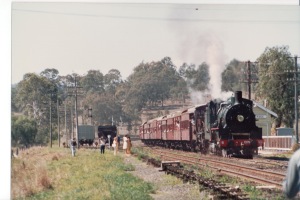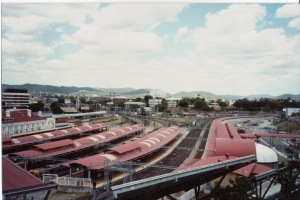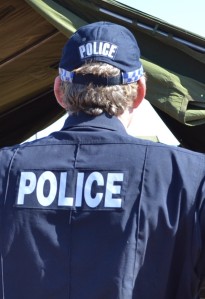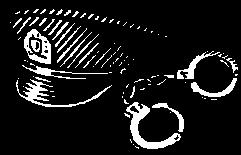This week I’m writing Week 47 in my Beyond the Internet series in which I explore the sources of information beyond our computer screens and this week’s topic is Police and Railway Staff records.
Archives can be a rich source of occupational records, ranging from publicans to police, railways or business, mariners or teachers. As always which records survive for your area of interest is variable and dependent on historical chance.
RAILWAY STAFF RECORDS
Firstly a word of warning: not all railway workers will have been employed by the government-owned railway even in Australia. Lengthsmen and gangers, the labourers of the railway line, may have been employed directly by large railway contractors such as O’Rourke & McSharry.
Overseas where the railway infrastructure and operations were undertaken by different companies it will be necessary to see if those business records have survived. Findmypast UK has some railway staff records online but others may remain elusive.

Where they exist, railway staff records can be rich in detail. My ancestral ones include dates of birth, commencement of service, progression through the ranks, commendations or penalties, relocations around the region and illness. Some of mine came directly from Queensland State Archives but others were obtained from dusty old card systems in Ipswich long before the Railway Museum was built.
There are also some excellent indexes to Queensland Railway staff and these may highlight the employment of women as gatekeepers or cleaners. It was not uncommon for married women whose husbands had a responsible role at a particular station to take on these duties, or for them to be given this type of work if a husband died at an early age. Government gazettes and parliamentary papers may also list railway workers.
Time does indeed make the heart grow fonder for Qld Rail as it seems the closer in time we are to the person the less likely we are to find staff records. While I have some from my 2xgreat grandfather, two great-grandfathers and my grandfather, my own father’s records were destroyed some time ago even though he retired less than 40 years ago!

These staff records can be used in conjunction with other sources to reveal more detailed information about their specific location location eg while posted to South East maintenance, a man might actually be working in a number of places in that area. School admission records are a great way to track movements within a region. Similarly Trove may provide useful tidbits about their lives.
Other Sources: If you want to know a little more about what life was life as a railway employee, or a member of their family member, this book, Living on the Line, provides first hand oral histories of railway life. You can also search my blog (top right hand corner) for search terms “railway” or “Queensland Rail” for my own experiences in a railway family. Also don’t forget to see if you ancestor was involved with railway operations during either World War I or World War II.
POLICE STAFF RECORDS
Police staff files are generally even more valuable to family historians than railway staff records (especially if you have policemen in your family!). They include much of the same detail but are more likely to include pages of documents rather than just a card index summary.
I have made significant finds in police files so I’m pleased that some of my family members diverted from serving the railway to the police.
Character references had to be obtained when applying to enter the police and one for Thomas Kunkel is elusively enlightening. A letter from Patrick O’Sullivan, MLA in Ipswich states that he had known my 2xgreat grandparents “so long and so well”. Had it perhaps been Patrick for whom George Kunkel had worked as a servant in his hotel? Or is this just my imaginings? Ironically nearly 100 years later I would know Patrick’s great-grandson who was the Jesuit priest with responsibility for the Newman Society at The University of Queensland.
Spouse checks: In the old days (not sure when it ended), Police had to obtain permission to marry. They advised the name of the woman they wanted to marry and there was then a character check on that person and her family. One can only assume that he must have asked his bride-to-be before sending off her name, otherwise the proposal would hardly have come as a surprise!
Thanks to this, I learned that one of my grandfather’s uncle applied to marry a particular woman, whose family provided a glowing reference from Archbishop Dunne, previously their parish priest. What went wrong after that is lost to time, but Thomas never did marry her. Adding insult to injury she married his brother Edward not long afterwards. Thomas’s performance record had been of a good standard before that but all of a sudden he was going AWOL, being drunk on duty, losing prisoners. Coincidence, I hardly think so.
Another relative’s file reveals his problem of “borrowing” a small amount of official money – when he volunteered this information and was repaying it, he was promptly discharged. I can imagine him confessing his sin to the priest and being told to make restitution only to then be tossed out – entirely justifiably, but no doubt distressing for all the family. The timing of this event coincides with his mother, Bridget McSharry, moving to Rockhampton and setting up a boarding house. Around this time or a little earlier, his father, James Sherry, entirely disappears from view – did he desert the family (not in police gazettes) or did he die but his death not get recorded? Was the timing a coincidence? Not sure.
Police staff files are subject to closure periods which may affect your ability to look at all or part of the file.
Other sources: once again try Trove to learn about arrests or events your ancestor may have been involved with and also look at Police Gazettes or Government Gazettes.
I think you’ll find these sources to be very helpful if you are lucky enough to have railwaymen or police on your family tree.
I’m always impressed by the wide variety of data sources that you use. I also really enjoy trying to find data that others may have missed. I think that we are kindred spirits. 🙂
LikeLike
I’m never quite sure I do them justice in these posts Sheryl so I’m glad you enjoy them. It’s the sleuth gene we share I suspect 😉
LikeLike
I have both railway employees and police in my ancestry. Unfortunately State Records don’t have anything for my great great grandfather who was a fireman with the railways, and was killed falling from an engine. For my great great uncle who was the head of the first drug squad in NSW, State Records has his employment card but not much else that specifically relates to him. I’ve been meaning to get in contact with Police Archives to see if they’ve got any more on him.
LikeLike
That’s unlucky Prue…a classic case of record availability varying between archives. Such a shame. Maybe you’ll get a photo of your policeman from the archives. Have any NSW Police histories been written?
LikeLike
I’ve seen photos of him, plus he was immortalised in Underbelly: Razor, but I’d like to know more about his police career than just the drug squad bit. There are no histories that I know of.
LikeLike
That’s a shame Prue -will ask the inlaws who were also in the NSW Police, just in case.
LikeLike
I posted my response here http://anglersrest.blogspot.co.uk/2012/12/beyond-internet-week-47-police-and.html, but forgot to share the link!
LikeLike
Yes I just spotted it and will visit and comment shortly. Thanks!
LikeLike